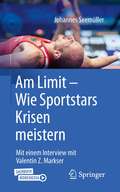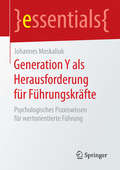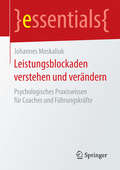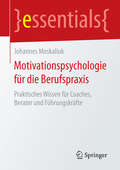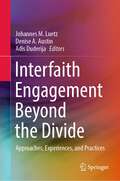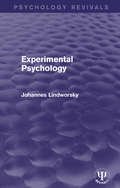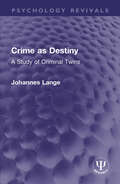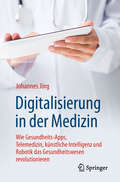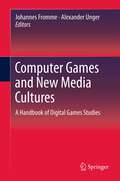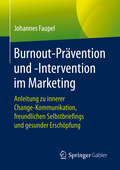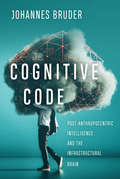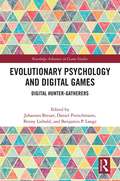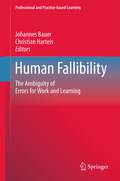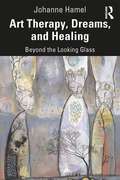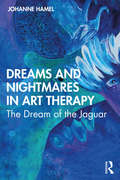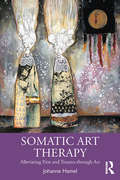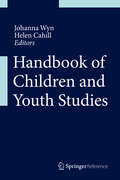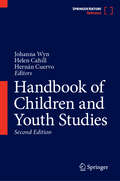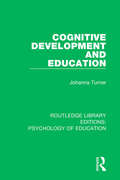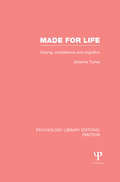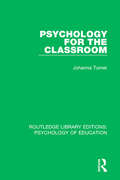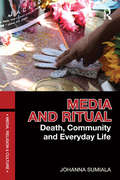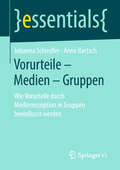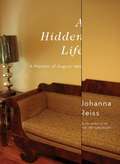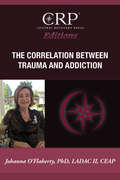- Table View
- List View
Am Limit – Wie Sportstars Krisen meistern: Mit einem Interview mit Valentin Z. Markser
by Johannes SeemüllerMedaillen und Titel sind die Währung erfolgreicher Sportler. Wer ganz oben steht, wird von den Medien zum Star gemacht und von den Fans verehrt. Hierfür gehen Leistungssportler an ihre körperlichen und mentalen Grenzen – und oft darüber hinaus. In diesem Buch erzählen Olympiasieger, Weltmeister und Champions League-Sieger durch exklusiv geführte Interviews über ihre Leidenschaft für den Sport. Sie berichten aber auch ungeschminkt über die Schattenseiten. Leistungsdruck, Burnout, Schmerzen, Magersucht, Depressionen, Ängste – nichts ist ihnen fremd. Gerald Asamoah · Matthias Behr · Karla Borger · Timo Hildebrand · Ottmar Hitzfeld · Clara Klug · Michael Köllner · Dominik Nerz · Elisabeth Seitz · Frank Stäbler · Kristina Vogel Selten sprachen Spitzensportler so offen darüber, wie sie mit Rückschlägen und Krisen umgegangen sind. Das Buch enthält abrufbare Videoausschnitte aus den geführten Gesprächen. Ergänzt werden die Porträts durch ein ausführliches Interview mit Dr. Valentin Z. Markser, einem der renommiertesten deutschen Sportpsychiater.
Generation Y als Herausforderung für Führungskräfte: Psychologisches Praxiswissen für wertorientierte Führung (essentials)
by Johannes MoskaliukIn diesem essential beschäftigt sich Johannes Moskaliuk mit der Generation Y. Dabei thematisiert er insbesondere Aspekte, die aus Sicht von Unternehmen und Führungskräften relevant sind. Der Autor gibt einen fundierten Überblick über wichtiges Praxiswissen und leitet konkrete Implikationen ab – so führt er in das Konzept der wertorientierten Führung ein und stellt Theorien zur Bedeutung von Werten für ein zufriedenstellendes und sinnerfülltes Leben vor sowie Coaching-Methoden, die sich dafür eignen, Werte zu identifizieren und weiterzuentwickeln.
Leistungsblockaden verstehen und verändern: Psychologisches Praxiswissen für Coaches und Führungskräfte (essentials)
by Johannes MoskaliukJohannes Moskaliuk stellt den Lesern praxiserprobte und wirksame Methoden vor, mit Leistungsblockaden umzugehen. Dazu präsentiert er psychologisches Praxiswissen, aus dem sich konkrete Strategien ergeben, Mitarbeitende und Klienten bei der Veränderung von Leistungsblockaden zu unterstützen. Der Autor geht jeweils kurz auf psychologische Theorien und Konzepte ein und leitet daraus konkrete Empfehlungen für die Praxis ab. Ein Schwerpunkt liegt auf Kommunikationsstrategien, die zur positiven Veränderung des Selbstkonzepts führen und das Vertrauen in die eigenen Fähigkeiten und Kompetenzen fördern. Außerdem beschreibt er Coaching-Tools, die Coaches, Berater oder Trainer direkt einsetzen können.
Motivationspsychologie für die Berufspraxis: Praktisches Wissen für Coaches, Berater und Führungskräfte (essentials)
by Johannes MoskaliukJohannes Moskaliuk stellt praxiserprobte und wirksame Methoden vor, die beim Erreichen von persönlichen Zielen unterstützen und dazu beitragen, die Motivation aufrechtzuerhalten. Grundlage sind aktuelle Theorien aus der Motivations- und Handlungspsychologie. Dabei geht er jeweils auf theoretische Grundlagen ein und leitet daraus konkrete Empfehlungen für die Praxis ab. In jedem Kapitel finden sich Links zu Coaching-Tools und Checklisten, die eingesetzt werden können, um Mitarbeitende und Klienten beim Erreichen von beruflichen und privaten Zielen zu unterstützen.
Interfaith Engagement Beyond the Divide: Approaches, Experiences, and Practices
by Adis Duderija Johannes M. Luetz Denise A. AustinThis book features reflections by scholars and practitioners from diverse religious traditions. It posits that the global challenges facing humanity today can only be mastered if humans from diverse faith traditions can meaningfully collaborate in support of human rights, reconciliation, sustainability, justice, and peace. Seeking to redress common distortions of religious mis- and dis-information, the book aims to construct interreligious common ground ‘beyond the divide’.Organised into three main sections, the book features sixteen conceptual, empirical, and practice-informed chapters that explore spirituality across faiths and cultures. Chapter 1 delineates the state of the art in relation to interfaith engagement, Chapters 2–8 advance theoretical research, Chapters 9–12 discuss empirical perspectives, and Chapters 13–16 showcase field projects and recount stories and lived experiences.Comprising works by scholars, professionals, and practitioners from around the globe, Interfaith Engagement Beyond the Divide: Approaches, Experiences, and Practices is an interdisciplinary publication on interreligious thought and engagement:Assembles a curated collection of chapters from numerous countries and diverse religious traditions;Addresses interfaith scholarship and praxis from a range of interdisciplinary perspectives;Comprises interfaith dialogue and collaborative research involving authors of different faiths;Envisions prospects for peace, interreligious harmony in diversity, and a world that may be equitably and enduringly shared.The appraisal of present and future challenges and opportunities, framed within a context of public policy and praxis, makes this interdisciplinary publication a useful tool for teaching, research, and policy development. Chapter 16 is available open access under a Creative Commons Attribution 4.0 International License via link.springer.com.
Experimental Psychology (Psychology Revivals)
by Johannes LindworskyOriginally published in German in 1923, this English edition was first published in 1931. From the translators preface: "Experimentelle Psychologie is characterized by an excellent summarizing of the most recent experimental data and by a spirit of fairness which it exhibits in organizing facts under general theoretical principles. Besides informing the reader, it stimulates him by critical remarks and suggestions for further thinking and experimentation." Today it can be read and enjoyed in its historical context.
Crime as Destiny: A Study of Criminal Twins (Psychology Revivals)
by Johannes LangeFirst published in 1931, Crime as Destiny throws a beam of light across the darkness which enshrouds the study of the deeper causes of crime and the eternal debate between nature versus nurture. The author’s investigations led him to conclusions of the first importance to the sociologist and the psychologist. But the subject is wilder than it seems and by its direct bearing on the question of determinism will arouse the interest of the theologian and the student of philosophy as well. For the student of history, this research work will help trace the beginning of the logic of eugenics that will eventually take its nightmarish form under Hitler.
Digitalisierung in der Medizin
by Johannes JörgDas Werk beschreibt anhand von 15 Fallbeispielen die bisherige und zukünftige Digitalisierung in der Medizin im Bereich von Gesundheits-Apps, Telemedizin, künstlicher Intelligenz und Robotik. Das Werk wendet sich an Ärzte aller Fachdisziplinen in Klinik oder Praxis, an Gesundheits-Ökonomen, an alle Mitarbeiter im Gesundheitswesen, besonders Pflegeberufe, Physiotherapeuten, Logopäden, aber auch an interessierte Laien oder Selbsthilfegruppen.Aufgezeigt wird u.a.Wie Gesundheits-Apps und Telemonitoring in der Kardiologie den Abstand zwischen Patient und Arzt durch mehr Eigenverantwortung verringern Wie Online- oder Video-Sprechstunden gegen überfüllte Wartezimmer helfen und die ärztliche Versorgung im ländlichen Raum verbessern Wie die Telemedizin im Rahmen der Schlaganfall-Versorgung die Notfallversorgung revolutioniert hat Wie sich mit der künstlichen Datenintelligenz sowie der Bild- und Gesichts-Erkennung die radiologische und dermatologische Diagnostik in den nächsten Jahren weiter verbessern werdenWie der Pflegeberuf durch Akademisierung und ärztliche telemedizinische Supervision die gewünschte Eigenverantwortung erfahren kann
Computer Games and New Media Cultures: A Handbook of Digital Games Studies
by Alexander Unger Johannes FrommeDigital gaming is today a significant economic phenomenon as well as being an intrinsic part of a convergent media culture in postmodern societies. Its ubiquity, as well as the sheer volume of hours young people spend gaming, should make it ripe for urgent academic enquiry, yet the subject was a research backwater until the turn of the millennium. Even today, as tens of millions of young people spend their waking hours manipulating avatars and gaming characters on computer screens, the subject is still treated with scepticism in some academic circles. This handbook aims to reflect the relevance and value of studying digital games, now the subject of a growing number of studies, surveys, conferences and publications. As an overview of the current state of research into digital gaming, the 42 papers included in this handbook focus on the social and cultural relevance of gaming. In doing so, they provide an alternative perspective to one-dimensional studies of gaming, whose agendas do not include cultural factors. The contributions, which range from theoretical approaches to empirical studies, cover various topics including analyses of games themselves, the player-game interaction, and the social context of gaming. In addition, the educational aspects of games and gaming are treated in a discrete section. With material on non-commercial gaming trends such as 'modding', and a multinational group of authors from eleven nations, the handbook is a vital publication demonstrating that new media cultures are far more complex and diverse than commonly assumed in a debate dominated by concerns over violent content.
Burnout-Prävention und -Intervention im Marketing: Anleitung zu innerer Change-Kommunikation, freundlichen Selbstbriefings und gesunder Erschöpfung
by Johannes FaupelIn diesem Buch erfahren Sie alles über Burnout-Prävention im Marketing Johannes Faupel behandelt in seinem Buch „Burnout-Prävention und -Intervention im Marketing“ folgende Themen: Wie Überforderungsmuster entstehenBurnout-Prävention und -InterventionUnerlässlich: Briefing und AuftragsklärungGesunde ErschöpfungWie es im Burnout-Kreislauf aussiehtKampagne entwickelnGesundheitsmanagement und gesunde ArbeitsweisenNeue Filme einspielenPseudo-Plausibilitäten, absurde Aufgaben und das Komplexitäts-ParadoxonDas Marathonprinzip und Grenzen erkennen Es richtet sich in erster Linie an Menschen, die in der Marketingbranche tätig sind und Erschöpfungs- und Burnoutsymptomen rechtzeitig bekämpfen wollen. Lernen Sie, auf Ihren Körper zu hören und erkennen Sie Warnsignale für Depressionen im Job Autor Johannes Faupel lehrt Sie in seinem Buch:Wie Sie sich aktiv mit den Rückmeldungen Ihres eigenen Körpers auseinandersetzenWie Sie diese richtig interpretierenWie Sie daraus einen gesunden und individuell passenden Arbeitsstil für sich entwickeln Lernen Sie Schritt für Schritt, wie Sie auf Ihren Körper hören und Burnouts vorbeugen. Nur so können Sie erste Anzeichen einer Depression im Beruf frühzeitig erkennen und rechtzeitig mit der Stressbewältigungstherapie beginnen, um dem Burnout in Ihrem Marketingalltag gezielt vorzubeugen.
Cognitive Code: Post-Anthropocentric Intelligence and the Infrastructural Brain
by Johannes BruderAs the second decade of the twenty-first century draws to a close, the cultural, social, and economic effects of artificial intelligence are becoming ever more apparent. Despite their long-intertwined histories, the fields of neuroscience and artificial intelligence research are notoriously divided. In Cognitive Code Johannes Bruder argues that seemingly incompatible scales of intelligence – the brain and the planet – are now intimately linked through neuroscience-inspired AI and computational cognitive neuroscience. Building on ethnographic fieldwork in brain imaging labs in the United Kingdom and Switzerland, alongside analyses of historical and contemporary literature, Cognitive Code examines how contemporary research on the brain makes routine use of engineering epistemologies and practices. Bruder elaborates on how the question of mimicking human cognition and thought on the scale of computer chips and circuits has gradually evolved into a comprehensive restructuring of the world through "smart" infrastructures. The brain, traditionally treated as a discrete object that thinks, is becoming part of the larger thinking network we now know as "the Cloud." The author traces a recent shift in the goals of brain imaging to show that the introduction of novel statistical and computational techniques has upset traditional paradigms and disentangled cognition from its biological substrate. Investigating understandings of intelligence from the micro to the macro, Cognitive Code explains how the future of human psychology is increasingly determined by engineering and design.
Evolutionary Psychology and Digital Games: Digital Hunter-Gatherers (Routledge Advances in Game Studies)
by Johannes Breuer Daniel Pietschmann Benny Liebold Benjamin P. LangeEvolutionary Psychology and Digital Games: Digital Hunter-Gatherers is the first edited volume that systematically applies evolutionary psychology to the study of the use and effects of digital games. The book is divided into four parts: Theories and Methods Emotion and Morality Social Interaction Learning and Motivation These topics reflect the main areas of digital games research as well as some of the basic categories of psychological research. The book is meant as a resource for researchers and graduate students in psychology, anthropology, media studies and communication as well as video game designers who are interested in learning more about the evolutionary roots of player behaviors and experiences.
Human Fallibility: The Ambiguity of Errors for Work and Learning
by Christian Harteis Johannes BauerA curious ambiguity surrounds errors in professional working contexts: they must be avoided in case they lead to adverse (and potentially disastrous) results, yet they also hold the key to improving our knowledge and procedures. In a further irony, it seems that a prerequisite for circumventing errors is our remaining open to their potential occurrence and learning from them when they do happen. This volume, the first to integrate interdisciplinary perspectives on learning from errors at work, presents theoretical concepts and empirical evidence in an attempt to establish under what conditions professionals deal with errors at work productively--in other words, learn the lessons they contain. By drawing upon and combining cognitive and action-oriented approaches to human error with theories of adult, professional, and workplace learning this book provides valuable insights which can be applied by workers and professionals. It includes systematic theoretical frameworks for explaining learning from errors in daily working life, methodologies and research instruments that facilitate the measurement of that learning, and empirical studies that investigate relevant determinants of learning from errors in different professions. Written by an international group of distinguished researchers from various disciplines, the chapters paint a comprehensive picture of the current state of the art in research on human fallibility and (learning from) errors at work.
Art Therapy, Dreams, and Healing: Beyond the Looking Glass
by Johanne HamelArt Therapy, Dreams, and Healing: Beyond the Looking Glass synthesizes methods to work with one’s dreams through art therapy and introduces the reader to brief creative methods, Gestalt and Jungian experiential methods, and research on lucid dreaming and dream re-entry. The author provides a unique, clear and concise synthesis of 19 available dreamwork methods to find the message of your dreams, with examples from her own 35 years of psychotherapy practice. Along with a classification of types and functions of dreams, chapters include information such as how to keep a dream journal, how to remember one’s dreams, how to identify 25 different dream types and how to follow your own dreamwork process. This book provides a succinct blend of available dreamwork methods for readers to find the existential message of their dreams and grow from them.
Dreams and Nightmares in Art Therapy: The Dream of the Jaguar
by Johanne HamelDreams and Nightmares in Art Therapy draws on the author’s extensive art psychotherapy practice and teaching to provide a wide range of creative writing and visual art methods for dreamwork. Blending theories such as Gestalt therapy and Jungian psychology with clinical examples from Dr. Hamel’s own clients, this unique book offers an array of art therapy and other creative dreamwork methods, covering a large variety of media such as mask making, clay, collage, sandtray and painting. The author also presents seven different types of nightmares and introduces a simple and efficient five-steps art therapy method for reducing their intensity and their frequency. The book concludes with a unique synthesis of 11 dreamwork methods to draw wisdom from dream journals accumulated over a long period of time. This book is ideal for anyone interested in developing a personal or professional practice using dream art therapy. The methods presented here will captivate readers with their originality and provide inspiration for all kinds of psychological, artistic and spiritual development.
Somatic Art Therapy: Alleviating Pain and Trauma through Art
by Johanne HamelThis book focuses on somatic art therapy for treating acute or chronic pain, especially resulting from physical and/or psychological trauma. It discusses the role of the psyche in physical healing and encourages combining of traditional medicine and holistic perspectives in treatment. Translated from the French text, this volume provides case studies and examples from the author’s art psychotherapy practice of 40 years, including the four-quadrants method. Chapters review the current treatments for chronic pain and PTSD and focus on art therapeutic methods to treat those conditions, such as art therapy protocols for PTSD. The book exposes the underlying rational of somatic art therapy, covering art therapy effectiveness, Levine’s somatic dissociation, van der Kolk’s somatic memory, and Scaer’s procedural memory concepts. Also featured are chapter contributions from art therapists Sophie Boudrias, Mylène Piché, and Dr. Patcharin Sughondhabirom. By providing a unique, clear and concise synthesis of available art therapy methods this text will appeal both to the general and professional public, including professional art therapists, psychotherapists, helping relation professionals, and medical practitioners.
Handbook of Children and Youth Studies
by Johanna Wyn Helen CahillChallenging theoretical and conceptual orthodoxies, this book presents interdisciplinary thinking and critical perspectives on childhood and youth, to address the emerging consensus that boundaries between childhood, youth and adulthood are blurred.
Handbook of Children and Youth Studies
by Johanna Wyn Helen Cahill Hernán CuervoThis second edition of the handbook gives a new scientific perspective to youth and childhood studies as multi scientific and interdisciplinary subjects which as such have not yet found their own framing in a particular discipline. It provides theoretical and methodological key debates and issues that develop and add an understanding of childhood and youth research discipline from a broader perspective. The Handbook on Children and Youth Studies draws on current thinking, but also challenges theoretical and conceptual orthodoxies in the field, drawing on interdisciplinary thinking and critical perspectives. It focuses on childhood and youth to address the emerging consensus that the boundaries between childhood, youth and adulthood are blurred. The view that defining youth and childhood largely in terms of problem topics is out dated. Instead, the handbook focuses on 16 themes that are open to international perspectives and to different conceptual approaches. Each theme is edited by a pair of field editors, thereby capturing a plurality of views. The 16 themes as a starting point are globally timely and they need scientific debates on the boundaries between childhoods, youth and adulthood. This handbook will meet the needs of childhood and youth researchers and the academics in the field. It recognizes the changing social context of the lives of children and young people, while developing theoretical frameworks and discussing about the core substantive issues of Children and Youth Studies.
Cognitive Development and Education (Routledge Library Editions: Psychology of Education)
by Johanna TurnerChildren think in a different way to adults. They also think differently at different ages. This book, originally published in 1984, studies the growth of those processes by means of which thinking evolves from infancy through childhood and adolescence into adulthood. It covers perception, memory, language and, above all, the development of mental ‘programmes’, or strategies, through which people structure and hence comprehend the information coming to them from their environment. The study of cognitive development has obvious educational implications. Development in the pre-school period, the appropriateness of schooling for levels of cognitive competence, and the significance of ageing are just some of the issues considered.
Made for Life: Coping, Competence and Cognition (Psychology Library Editions: Emotion)
by Johanna TurnerOriginally published in 1980, this title considers the relationship between feeling able to cope and being able to learn – that is, the interdependence of affect and cognition in children under five. It argues that in order to make full use of his cognitive capacities the child must first develop the belief that he is able to cope and be effective. When the child enters school at the age of five his behaviour will reflect the influence of various important developmental factors. It is only by understanding the nature of the interactions of these influences that one can sympathetically appreciate and, if necessary, modify the child’s perception of the situation with which he is faced. The argument presented follows the discrete strands of development which form the plait of individual differential perception and draws upon the case of work of clinicians using psychoanalytic concepts, experimental investigations of infants and children, naturalistic observations and longitudinal studies, since it is believed that these contemporary, yet distinct, approaches draw attention to different aspects of the multifaceted human child. As such the book was both a useful survey of this important complex field of study at the time and is still a stimulating contribution to the debate.
Psychology for the Classroom (Routledge Library Editions: Psychology of Education)
by Johanna TurnerOriginally published in 1977, Psychology for the Classroom is offered as an aid to people who are learning themselves and helping other people to learn: that is, to parents, students and particularly to teachers. The activity of teaching, to be successful, requires the teacher to understand the behaviour of the learner as fully as possible. Some of the insights into human behaviour gained by psychologists may prove helpful to the teacher in complementing his or her experience and intuitive understanding, and it is with this in mind that the topics covered in this book have been selected. Section one deals with cognitive aspects, an understanding of which his essential since cognitive processes are the means by which individuals are able to make sense of their environment. Section two considers the social situation in which knowledge and understanding develop, i.e. the way in which social interaction affects learning. Section three focuses on the individual, stressing that academic achievement depends not only on hard work but is intimately related to an individual’s personal development and personality. The book will be valuable to psychology students, student teachers and teachers on in-service courses, for its coverage of relevant psychological research and the description of pertinent experiments and studies of the time. Its originality lies in the way in which it communicates the importance of teachers using psychology as a basis for forming hypotheses which they can test for themselves – not necessarily as researchers, but in a mood of personal exploration.
Media and Ritual: Death, Community and Everyday Life (Media, Religion and Culture)
by Johanna SumialaThis wide-ranging and accessible book offers a stimulating introduction to the field of media anthropology and the study of religious ritual. Johanna Sumiala explores the interweaving of rituals, communication and community. She uses the tools of anthropological enquiry to examine a variety of media events, including the death of Michael Jackson, a royal wedding and the transgressive actions which took place in Abu Ghraib, and to understand the inner significance of the media coverage of such events. The book deals with theories of ritual, media as ritual including reception, production and representation, and rituals of death in the media. It will be invaluable to students and scholars alike across media, religion and anthropology.
Vorurteile – Medien – Gruppen: Wie Vorurteile durch Medienrezeption in Gruppen beeinflusst werden (essentials)
by Johanna Schindler Anne BartschIm Alltag haben viele Menschen fast ausschließlich über Medieninhalte Kontakt zu Angehörigen verschiedener anderer gesellschaftlicher Gruppen (Outgroups). Gleichzeitig nutzen und verarbeiten sie Medieninhalte häufig gemeinsam in ihrer eigenen Gruppe (Ingroup). Johanna Schindler und Anne Bartsch beleuchten den Einfluss der Medienrezeption in Kleingruppen auf Vorurteile gegenüber Outgroups. Dazu systematisieren sie wissenschaftliche Erkenntnisse zu Vorurteilen und zur Medienrezeption in Gruppen und verbinden diese miteinander. Außerdem stellen die Autorinnen die Ergebnisse einer explorativen Feldstudie vor. Auf diese Weise wird eine integrative Perspektive auf Gruppenphänomene in der modernen Mediengesellschaft ermöglicht.Die AutorinnenJohanna Schindler ist wissenschaftliche Mitarbeiterin am Institut für Kommunikationswissenschaft und Medienforschung der Ludwig-Maximilians-Universität München. Prof. Dr. Anne Bartsch ist Professorin für Empirische Kommunikations- und Medienwissenschaft am IfKMW der Universität Leipzig.
A Hidden Life: A Memoir of August 1969
by Johanna ReissIn 1969, Reiss made the trip to Holland to chronicle the two years, seven months, and one day she had spent hiding from the Nazis. Subtle and disturbing, the book is a powerful consideration of memory, violence, and loss, told in a stunning and sparse narrative style.
The Correlation Between Trauma and Addiction
by Johanna O'FlahertyA succinct and compelling treatise on the bio-psycho-social effects of trauma, and the connections between trauma and addiction, as well as how these conditions facilitate each other. The challenges of working effectively with those struggling with trauma and co-occurring addiction in treatment settings are presented, along with recommended approaches for those in treatment and early addiction recovery.There is a clear relationship between trauma and addiction. Although addiction is not caused by trauma, and trauma is not caused by addiction, it has become increasingly clear that trauma and addiction frequently go together. Extensive research suggests that approximately 50 percent of people with histories of addiction have experienced trauma.Based on different scientific studies, the percentage of people with both trauma and addiction ranges from about 20 percent to as high as 80 percent, with the figure being somewhat higher for women than for men. The connection between trauma and addiction is a two-way street: trauma increases the risk of developing addiction and active addiction increases the likelihood of experiencing trauma.
